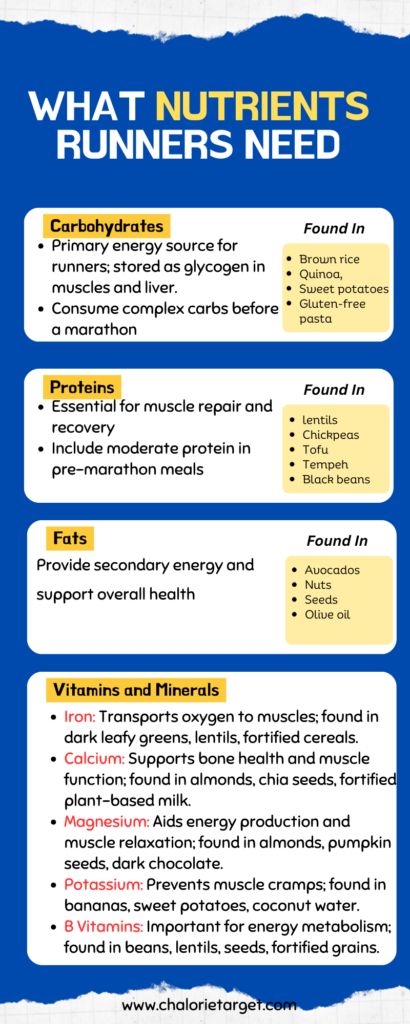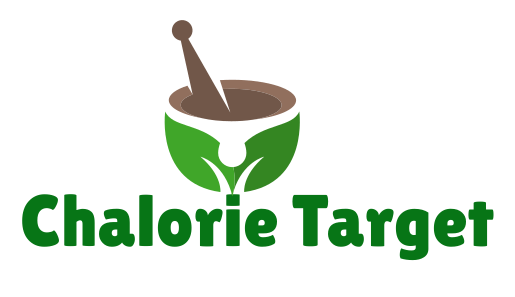Preparing for a marathon involves more than just training; your nutrition plays a crucial role in your performance. Knowing what to eat the night before marathon can make a significant difference in your energy levels and endurance on race day.
Preparing for a marathon involves more than just the right training plan; fueling your body correctly is crucial to ensure peak performance on race day.
1. What Nutrients Runners Need
Proper nutrition is vital for marathon runners to maintain their energy levels, prevent fatigue, and aid recovery. Understanding which nutrients are essential and where to find them can help optimize performance.
Here’s a breakdown of the critical nutrients runners need and the best gluten-free, vegetarian foods to include.
a. Carbohydrates
Carbohydrates are runners’ primary source of energy. They are stored in the muscles and liver as glycogen, which is essential for sustained endurance. Consuming complex carbohydrates on the night before a marathon is important to ensure that glycogen stores are full. Foods high in complex carbohydrates include brown rice, quinoa, sweet potatoes, and gluten-free pasta.
b. Protein
Protein is crucial for muscle repair and recovery, particularly after long runs or intense training sessions. For vegetarian runners, there are plenty of excellent sources of protein that are also gluten-free.
Some good food sources are lentils, chickpeas, tofu, tempeh, and black beans. Including a moderate amount of protein in your pre-marathon meal can help prepare your muscles for the upcoming physical stress.
c. Fats
Healthy fats are essential for overall health and can provide a secondary energy source during longer runs. Unsaturated fats, such as avocados, nuts, seeds, and olive oil, are particularly beneficial. Adding these to your meals can help you feel satiated without causing digestive discomfort.
d. Vitamins and Minerals
Vitamins and minerals are significant in energy production, muscle functionality, and hydration. Essential vitamins and minerals for runners include:
- Iron: Essential for transporting oxygen to the muscles, iron can be found in dark leafy greens like spinach and kale, as well as in lentils and fortified gluten-free cereals.
- Calcium: Necessary for bone health and muscle function, calcium-rich foods include almonds, chia seeds, and fortified plant-based milk.
- Magnesium: Important for energy production and muscle relaxation, magnesium can be sourced from almonds, pumpkin seeds, and dark chocolate.
- Potassium: Vital for muscle function and preventing cramps; potassium is abundant in bananas, sweet potatoes, and coconut water.
- B Vitamins: Crucial for energy metabolism, B vitamins can be found in beans, lentils, seeds, and fortified gluten-free grains.
By focusing on these critical nutrients and incorporating the right foods, runners can ensure they are properly fueled and ready to tackle the demanding challenge of a marathon.

Read More: How to Stay Consistent with Working Out and Diet
2. Critical Components of Your Pre-Marathon Meal
- High-Carb Options: Fuel your body with complex carbohydrates to ensure you have plenty of glycogen stored for the marathon. Great options include quinoa, sweet potatoes, or gluten-free pasta.
- Lean Protein Sources: If you are not strictly vegetarian, aid muscle repair and growth with proteins like tofu, legumes, or grilled chicken.
- Healthy Fats: Support sustained energy and joint health with avocados, nuts, or olive oil fats.
- Variety of Vegetables: Ensure you get a good mix of fiber, vitamins, and minerals to support overall health.
3. What to Eat After a Run
After crossing the marathon finish line, focusing on recovery nutrition is crucial to replenish depleted energy stores, repair muscles, and rehydrate. Here are some key food components and precise one-liner ingredients to include in your post-run meal:
a. Carbohydrates for Glycogen Replenishment
- Brown rice: A gluten-free staple to restore glycogen efficiently.
- Bananas: Quick and easy source of carbs and potassium.
b. Protein for Muscle Repair
- Greek yogurt: High in protein to support muscle recovery.
- Chickpeas: Versatile protein source for salads or snacks.
c. Healthy Fats for Sustained Energy
- Avocado: Offers healthy fats and vital nutrients.
- Chia seeds: Great for adding healthy fats and fiber.
d. Hydration and Electrolytes
- Coconut water: Natural source of electrolytes for rehydration.
- Watermelon: Hydrating fruit with essential vitamins.
Ensuring these components are part of your post-run meal can significantly aid your recovery, allowing you to bounce back stronger for your next run.
Read More: What is an Active Calorie: Your Guide to Enhanced Fitness and Weight Management
4. Hydration Tips
- Hydrate Throughout the Day: Aim to drink at least 8-10 glasses of water daily to ensure proper hydration.
- Electrolytes: Incorporate electrolyte-rich beverages or foods, such as coconut water, to help maintain a fluid balance.
- Avoid Caffeine and Alcohol: Both can lead to dehydration, so it’s best to avoid them.
- Pre-Bed Hydration: Consider consuming a light, hydrating snack like a water-rich fruit before bed.
5. What is the Ideal Diet While Training for a Marathon?
a. Balanced Macronutrients
Balancing macronutrients—carbs, proteins, and fats—is crucial for runners. Carbs loading should make up 60-70% of total calories to replenish glycogen stores. Opt for complex carbs like oatmeal and whole grains.
Proteins aid muscle repair; include high-quality sources like quinoa and lentils for vegetarians/vegans. Healthy fats support hormones and joint health; choose unsaturated fats from nuts, seeds, avocados, and fatty fish.
b. Micronutrient Essentials
In addition to macronutrients, micronutrients are equally crucial for marathon training. Micronutrients, including vitamins and minerals, play critical roles in energy production, oxygen transport, and overall muscle function. Here are some essential micronutrients to focus on:
- Iron: Essential for oxygen transport in the blood, iron helps prevent fatigue and anemia. Female runners are particularly susceptible to iron deficiency. Good sources include lean meats, spinach, lentils, and fortified cereals.
- Calcium: Important for bone health and muscle function, calcium helps prevent stress fractures, common in athletes. Dairy products, fortified plant-based milks, leafy greens, and tofu are excellent sources.
- Magnesium: This mineral is crucial for muscle relaxation and energy production. Magnesium-rich foods include nuts, seeds, whole grains, and dark chocolate.
- Vitamin D: Vital for calcium absorption and bone health; vitamin D can be obtained from sun exposure and foods like fatty fish, egg yolks, and fortified dairy or plant-based milk.
- Antioxidants: Vitamins A, C, and E, found in various fruits and vegetables, help combat oxidative stress caused by intense training. They support immune function and reduce inflammation.
c. Timing and Meal Planning
Proper timing of meals and snacks can significantly influence performance and recovery. Here are some strategies:
- Pre-Run Nutrition: Consume a balanced meal with carbs, protein, and a small amount of fat about 2-3 hours before a run. A light snack like a banana or an energy bar can be eaten 30-60 minutes before running.
- During Long Runs: For runs longer than 90 minutes, consider consuming easily digestible carbohydrates such as energy gels, chews, or sports drinks to maintain energy levels.
- Post-Run Nutrition: Aim to eat a balanced meal within 30-60 minutes after a run. This meal should include protein for muscle repair, carbohydrates to replenish glycogen stores and rehydration fluids.
d. Special Dietary Considerations
Individual dietary needs vary based on health conditions, allergies, intolerances, and ethical choices. Here are a few considerations:
- Vegetarian/Vegan Runners: Pay special attention to obtaining enough protein, iron, and vitamin B12, commonly found in animal products.
- Gluten-Free Diet: Focus on gluten-free carb sources such as quinoa, brown rice, sweet potatoes, and gluten-free oats. Ensure packaged foods are labeled gluten-free to avoid cross-contamination.
- Low FODMAP Diet: For runners with irritable bowel syndrome (IBS), following a low FODMAP diet may help reduce gastrointestinal distress. Work with a dietitian to identify trigger foods and appropriate alternatives.
Maintaining a well-balanced and tailored diet throughout training will help optimize performance, enhance recovery, and support overall health, ultimately aiding runners in achieving their marathon goals.
6. Rules to Remember During Race Week
- Stay Hydrated: Keep drinking water and electrolyte-rich fluids throughout the week.
- Eat Balanced Meals: Eat well-rounded meals with carbs, protein, and healthy fats.
- Get Enough Sleep: Aim for 7-8 hours of quality sleep each night.
- Avoid New Foods: Stick to familiar foods to avoid any digestive issues.
- Plan Your Outfit: Make sure your race-day clothing and shoes are comfortable and broken in.
- Rest and Recover: Include rest days to allow your body to recuperate.
- Practice Mental Preparation: Visualize the race and plan your pacing strategy.
- Check the Weather: Prepare for race-day conditions and adjust your gear accordingly.
- Review Race Logistics: Know the race route, start time, and where to find aid stations.
- Stay Positive: Keep a positive mindset and trust in your training.
